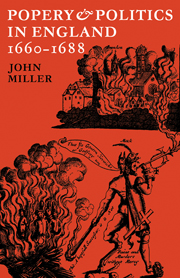Book contents
- Frontmatter
- Contents
- Preface
- Abbreviations
- Note on spellings and dates
- Introduction
- 1 The Catholic laity
- 2 England and Rome: the Catholic clergy
- 3 The penal laws and their enforcement
- 4 The development of the anti-Catholic tradition
- 5 The Restoration settlement and after
- 6 The French alliance and ‘Catholicity’
- 7 York and Danby
- 8 The Popish Plot and the Exclusion Crisis
- 9 The Tory reaction
- 10 James II and the Church of England Men
- 11 James II and the Dissenters
- 12 James II and Rome
- 13 The missionary effort under James II
- 14 The opposition to James II
- Appendices
- Select Bibliography
- Index
- Frontmatter
- Contents
- Preface
- Abbreviations
- Note on spellings and dates
- Introduction
- 1 The Catholic laity
- 2 England and Rome: the Catholic clergy
- 3 The penal laws and their enforcement
- 4 The development of the anti-Catholic tradition
- 5 The Restoration settlement and after
- 6 The French alliance and ‘Catholicity’
- 7 York and Danby
- 8 The Popish Plot and the Exclusion Crisis
- 9 The Tory reaction
- 10 James II and the Church of England Men
- 11 James II and the Dissenters
- 12 James II and Rome
- 13 The missionary effort under James II
- 14 The opposition to James II
- Appendices
- Select Bibliography
- Index
Summary
After the Oxford Parliament the Catholic question gradually dropped out of politics until it re-emerged late in 1684. Whig propaganda concentrated less on anti-Catholicism than on abusing the Tories. There were incidents of violence which were expressions of anger and frustration. In November 1681 the queen's lacemaker lit a small bonfire to celebrate her birthday; a crowd put it out, saying that it was a Popish fire, and smashed his windows. Several violent affrays, mostly against Tories, followed the ignoramus verdict in Shaftesbury's case. Huguenots in Norwich were attacked, apparently because they were thought to be Papists. But the government soon got the upper hand, banning pope-burnings and even bonfires in London. Charles at last undertook an Anglican, authoritarian policy of the kind Danby had advocated. He appealed to ‘gentlemen who go on the Church of England and the old Cavalier principles, which. … are the only principles that are safe for the government and comfortable to the conscience’. This policy was very successful. The Exclusion Crisis had reopened divisions in the political nation similar to those left by the Civil War, which had been slurred over by fears of James and the court and by the Popish Plot. The Tories had rallied to the king; now they were to have their reward, in the form of a monopoly of places and the persecution of Dissenters and Whigs. Meanwhile, to prevent mistrust, no open favour was to be shown to Catholics.
- Type
- Chapter
- Information
- Popery and Politics in England 1660–1688 , pp. 189 - 195Publisher: Cambridge University PressPrint publication year: 1973



